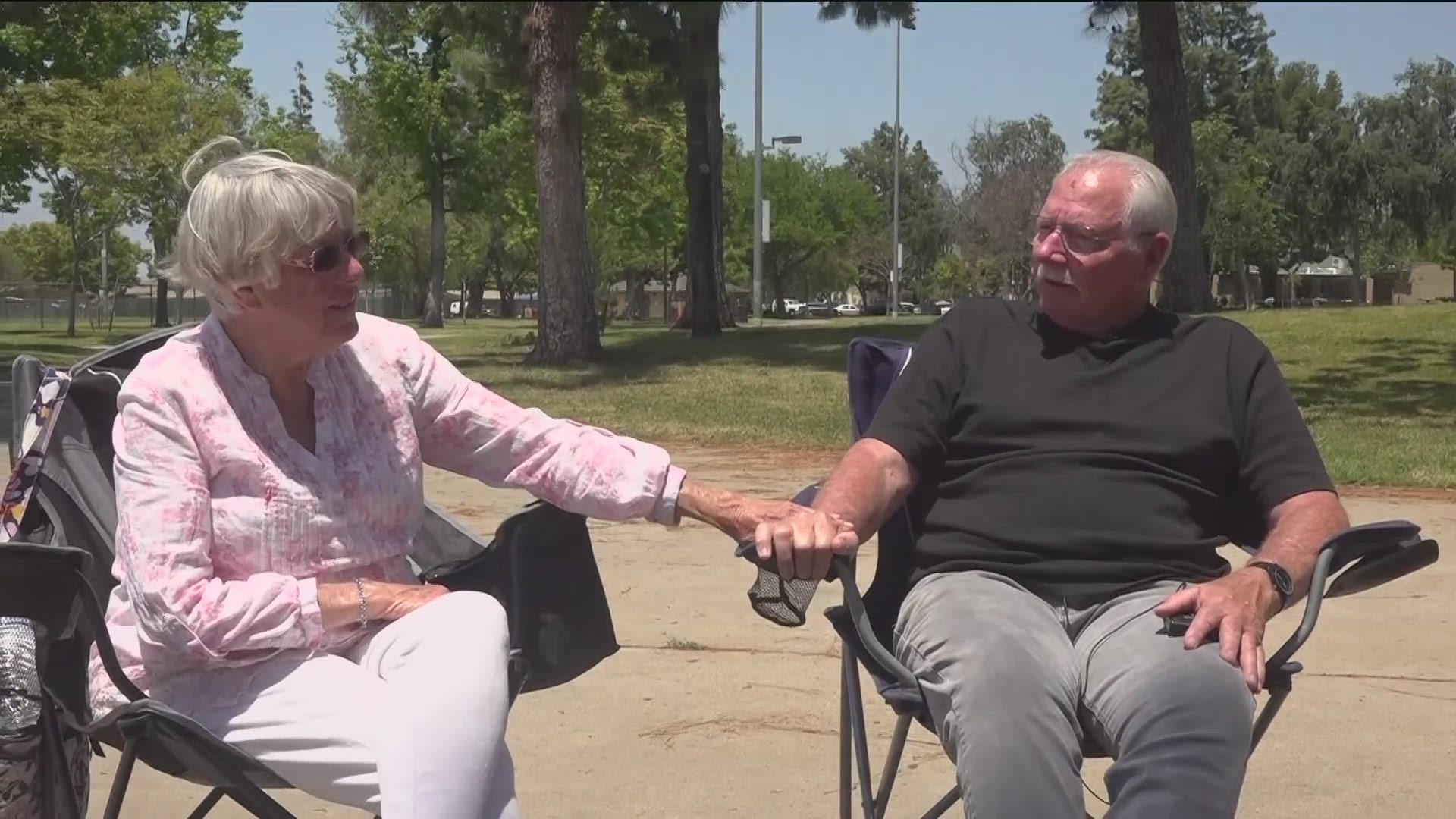SAN DIEGO — There's a growing number of Alzheimer’s and dementia patients and caregivers in California, which can add more stress to a family. And while it's hard to ask for help, there is a reprieve for the caregivers at no cost.
Caregivers are often consumed with caring for their loved one living with an illness, but those caregivers may forget that they need to take care of themselves to take care of others.
Barbara Christensen has held many hands.
“It’s just a position you’ve had your whole life essentially,” said Christensen.
As a retired teacher she held the hands of her students, as a mother, it was for her children. As a wife she held the weight of taking care of her first husband, Steven, who died from pancreatic cancer.
But one of the hardest hands to hold was Daniel Baker. He was her second husband who was diagnosed with the incurable disease, Alzheimer’s.
“You just reach a point where you physically can't do it. And you say, ‘whoa, I need somebody here for a period of time to get my mind back in,’” said Christensen.
Dave Zietlow was married to his wife Donna for 40 plus years. He held her hand for six years while she battled early onset Alzheimer's.
“The first couple years, ‘hey, I've got this, you know, I can do this. It’s not a big deal.’ But then as they age and their disease progresses, I mean, you're going, ‘oh, my gosh, what am I going to do now,’” said Zietlow.
These breaking points are felt by so many family members, spouses, even friends when taking on the role of a caretaker.
“The number that we have in San Diego County of caregivers is about 460,000 family caregivers that we know of,” said Martha Rañón, Executive Vice President, Southern Caregivers Resource Center.
That's a low estimate. The San Diego County Aging and Independence Services says some people don't even consider themselves a caregiver.
“It can be as young as a college aged student to a spouse in their 80’s,” said Matthew Parcasio, Family Caregiver Support Program manager, San Diego County Aging and Independence Services.
And the number of memory loss patients and caregivers is growing.
In its 2023 report, the Alzheimer’s Association says there are 1,374,000 Alzheimer’s and dementia family caregivers in California, providing an estimated 1,864,000,000 hours of unpaid care valued at $44,277,000,000.
Seniorly, an advocate for the aging community, reports 58% of family caregivers report extreme stress, 47% less sleep, and 43% feel isolated.
“Asking for help is not a sign of weakness. It's a sign of strength. And we want you to be empowered to fend for yourself, but also look out for yourself,” said Rañón.
Before she became the executive vice president of the Southern Caregivers Resource Center, she leaned on the non-profit while caring for her aunt with dementia.
“I thought I could go online, pick up a brochure and realize that mentally and emotionally, I needed help,” said Rañón.
In partnership with the County and grants, SCRC offers free counseling, support groups, education but also some respite services at no cost.
“We will walk you through that whole process hand in hand until you let us know that ‘okay, I'm good,’” said Rañón.
She says a qualified and vetted in-home care volunteer can help for a few hours, all day or while on vacation.
“It felt like respite care allowed me to give somebody else my burden for a few hours, and go do something that was for me. It might have been grocery shopping, or swimming,” said Christensen.
The free services are essential. Not only can an illness cause physical and emotional stress but there's also a financial burden. Some in-home care costs at least $30 an hour.
The County also works with Coast Care Partners to offer respite services.
For the cost sharing programs, the County says it pays for half.
“It’s essential that caregivers take a break, to care for themselves, and to care for their own health and wellbeing and more importantly, mental health,” said Parcasio.
That care for a caretaker can come in all forms and is just as important after a loved one dies.
“It’s been four years. Thank God for Barbara,” said Zietlow.
As Dave remembers the days with his late wife, Barbara leans over and holds his hand to provide comfort. She still holds on to the love of her late husbands while still lovingly holding Dave's hand since they met in an Alzheimer’s support group four years ago.
“I tried to think of his [Steven’s] love still being with me. And it was. So now I have Dave's love,” said Christensen.
Caregiver Resources:
Watch Related: Alzheimer's Disease: News 8's Marcella Lee and her mom begin the journey (Nov 20, 2019)

